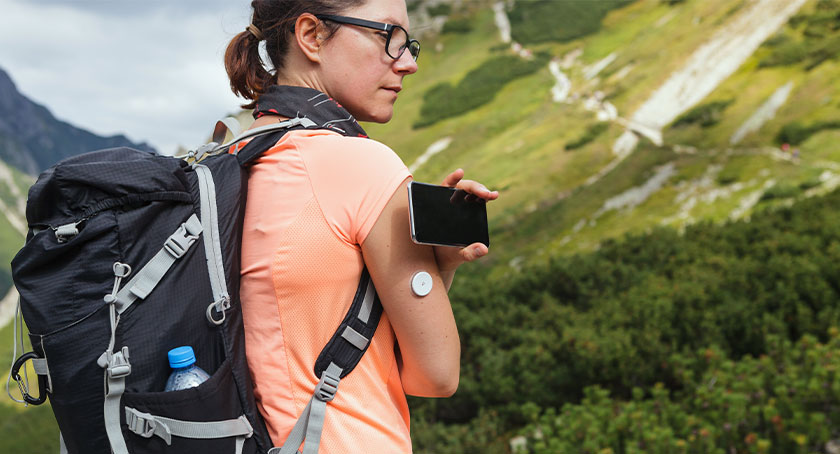Features
Blood Sugar and Health: Benefits for Beauty
Diabetes drugs like Ozempic have helped spotlight the importance of blood glucose for all sorts of health issues.

By: Sean Moloughney

An estimated 38.1 million people aged 18 or older had diabetes in 2021, according to the CDC. That’s 14.7% of the U.S. adult population.
Meanwhile, 97.6 million people 18 years or older have prediabetes, or 38% of the adult U.S. population.
Blood sugar control among adults with diabetes in the U.S. has declined significantly in the past decade, according to a nationwide study from researchers at the Johns Hopkins Bloomberg School of Public Health. Published in the New England Journal of Medicine in 2021, the findings highlight the ongoing challenges of controlling one of the nation’s most prevalent chronic health conditions.
Diabetes mostly occurs in the form of type 2 diabetes which is strongly related to diet and lifestyle factors. The disease represents an ongoing public health crisis.
By causing chronic high blood sugar and associated high blood pressure and high cholesterol, diabetes increases the risks of other serious diseases, especially cardiovascular disease and complications, including amputation and kidney disease.
“These trends are a wake-up call, since they mean that millions of Americans with diabetes are at higher risk for major complications,” said Michael Fang, PhD, a postdoctoral fellow at the Bloomberg School and lead author of the study.
“Our study suggests that worsening control of diabetes may already be having a detrimental effect at the national level,” he added.
At the same time, the prevalence of obesity among U.S. adults 20 and over was 41.9% from 2017 to March 2020. During the same time, the prevalence of severe obesity among U.S. adults was 9.2%. This means that more than 100 million adults have obesity, and more than 22 million adults have severe obesity.
Obesity accounts for nearly $173 billion in medical expenditures in 2019 dollars, according to the CDC. Annual medical costs for obese adults were $1,861 higher per person than adults with healthy weight.
GLP-1 Prevalence
This was the public health crisis before the class of prescription medications known as GLP-1 agonists like Ozempic burst onto the scene.About 1 in 8 adults in the U.S. has now used a GLP-1 drug like Ozempic or Mounjaro at some point, and half of them — about 6% of adults, or more than 15 million people — are currently using a prescription, according to May survey data from KFF.
The share who report ever taking these drugs rises to four in 10 (43%) among adults who have been told by a doctor that they have diabetes, a quarter who have been told they have heart disease, and one in five (22%) who have been told by a doctor that they are overweight or obese in the past 5 years.
Public awareness of GLP-1 drugs has increased in the past year, with about one-third (32%) of adults now saying they have heard “a lot” about these drugs, up from 19% in July 2023.
Most adults who have taken GLP-1 drugs say they took them to treat a chronic condition including diabetes or heart disease (62%), while about four in 10 say they took them primarily to lose weight.
High blood sugar levels can have a devastating impact on overall health. At the same time, while GLP-1 drugs are incredibly effective, they also have side effects. The most common reported issues have been gastrointestinal problems like nausea, vomiting, diarrhea, and abdominal pain.
While less problematic, rapid weight loss can result in sagging skin and the appearance of lines or wrinkles. “Ozempic face” has come to describe these facial skin changes.
Alongside Google searches for Ozempic, “Ozempic Face” is a top related concern (only second to weight) that receives 226.9K searches on average each month, according to Spate.
“This concern has grown in consumer interest +13.4% since last year,” said Addison Cain, beauty strategy and innovation manager at Spate. “Hair loss is another concern that consumers associate with Ozempic, though significantly smaller in search volume (720 average monthly searches) and declining -2.0% in searches since last year.”
“Ozempic Face views on TikTok are up +33.3% since last year,” she continued, “indicating this topic is top of mind for consumers on social media as well. Given the interest in this topic, beauty companies should consider ways to address the visual Ozempic side effects with their customers.”
Glucose Control
Blood sugar has become a hot topic in the nutraceuticals world of late, fueled in part by people looking for more natural alternatives to new drug options.While there is no such thing as “Nature’s Ozempic,” buzz around berberine has propelled this phytochemical up the sales charts.
Pharmavite’s Nature Made, the top pharmacist-recommended vitamin and supplement brand, recently introduced Better Absorption Berberine Phytosome in 550 mg capsules to help support healthy glucose and lipid metabolism and cardiovascular health. Suggested use is for adults to take one capsule two times daily with water for at least 2 months.
But the blood sugar market is about much more than berberine. French biochemist Jessie Inchauspé, aka the Glucose Goddess, offers “hacks” meant to minimize blood-sugar spikes.
She has two bestselling books, 4.3 million Instagram followers, a podcast, an online certification course, a recipe club, and a new supplement called Anti-Spike Formula that contains White mulberry leaf (Reducose, 250 mg), Citrus polyphenols (Eriomin, 250 mg), antioxidants (blend of 100 mg of vegetable extracts), and cinnamon bark extract (85 mg).
The product claims to: reduce a meal’s glucose spike by up to 40%, lower fasting glucose by 8 mg/dL, reduce insulin resistance by 11%, increase GLP-1 by 15%, and feed good gut bacteria.

Blood Sugar and Impact on Appearance
Maintaining balanced blood sugar levels is essential not only for overall health but also for preserving the vitality of skin and hair. Elevated blood sugar can have detrimental effects on appearance, accelerating the aging process.For example, high blood sugar accelerates the production of advanced glycation end-products (AGEs), which damage collagen and elastin, the proteins that keep skin firm and youthful. As a result, skin may become more prone to wrinkles, sagging, and loss of elasticity.
High blood sugar can also lead to dehydration, which in turn causes the skin to become dry and itchy. Poor circulation can also reduce blood flow to the skin, leading to dryness and a lack of essential nutrients.
Prolonged high blood sugar can also lead to hair loss or thinning. Poor circulation due to damaged blood vessels reduces the supply of oxygen and nutrients to hair follicles, weakening them and causing hair to thin or fall out.
More broadly, elevated blood sugar levels can trigger inflammatory responses in the body. Chronic inflammation is linked to various skin issues, including acne, rosacea, and premature aging. Insulin resistance itself is a pro-inflammatory state. It leads to the release of inflammatory markers like C-reactive protein (CRP) and interleukin-6 (IL-6). This chronic low-grade inflammation can affect various tissues and organs, including the skin.
High blood sugar levels increase the production of free radicals and ROS. These unstable molecules can damage cells, proteins, and DNA, leading to oxidative stress. The body responds to oxidative stress with inflammation as it attempts to repair damage. This ongoing process can result in chronic inflammation.
High blood sugar levels may also alter the composition of the gut microbiome, leading to dysbiosis (an imbalance of gut bacteria), which can disrupt the gut barrier, allowing endotoxins (lipopolysaccharides) to enter the bloodstream, triggering an inflammatory response.
Excess glucose can be stored as fat, particularly in the abdominal region.
Adipose (fat) tissue, especially when enlarged, can become inflamed and release pro-inflammatory cytokines such as tumor necrosis factor-alpha (TNF-α) and IL-6, contributing to systemic inflammation.


